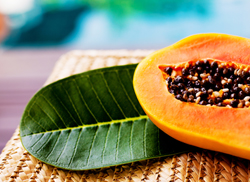
Researchers at Egerton University believe they have found the perfect ingredient to animal feed and way to counter malnutrition in children.
Every day, thousands of pawpaw fruits are consumed in homes and fruit salad bars across Kenya. To eat a pawpaw, you slice it open and remove the seeds which are thrown away as waste.
However, at the Kisumu-based Maseno University, there is a new discovery of full utilisation of pawpaw seeds, which are usually treated as 100 percent waste.
During the 2018 Kisumu International Show, organized by the Agriculture Society of Kenya (ASK), Maseno University showcased the papaya oil, which sold fast, owing to its nutritional and health benefits. Mr. Boniface Jiveri is the brain behind the innovative idea of extracting oil from pawpaw seeds.
Coffee farmers usually deliver their produce to the factories, where the berries are only processed up to the parchment stage before being sent for auctioning.
At a tender age of 28, he is undertaking his Phd in Medical Microbiology, and his innovative ideas are just gaining momentum.
“It is in as part of my research that I discovered the health benefits of papaya seeds oil, which I am turning to an economic venture,” said Jiveri.
Besides the oil, the outer skin of the pawpaw seeds is used to make animal feeds, while the inner cover, is ground to flour which is used as a nutritional supplement for people with compromised immunity.
For a long time, Jiveri says, he observed how pawpaw seeds went to waste, everyday, especially from fruit salad vendors who use hundreds of the fruits daily in their business.
This, he adds, triggered him to carry out research on the seeds, and he discovered that there is actually more that can be extracted from the tiny, black seeds. In his research, he found out that the seeds did not only contain beneficial nutrients, but their oil was also; anti-bacterial, anti-parasitic, anti-cancerous, anti-inflammatory, protects liver, protects kidney and improves digestion.
The process of extracting oil starts from collecting seeds especially from local fruit salad sellers. Initially, the vendors had offered the seeds free of charge.
After collection, the seeds are then cleaned and left to dry under the sun for 2-3 days. The next process involves removing the outer husks of the seeds, which are used as bio-fertilizer or animal seeds.
The inner seeds are tiny, round and creamish in colour. Someone would easily mistake them for a variety of millet grains. These inner seeds are then mechanically milled into flour, just like maize or other cereals are milled.
The flour is then cold-pressed using a locally made presser, to produce extra-virgin oil. This last process separates the oil from the flour, which are then packaged separately. The flour is mixed with ground mushroom, to make a nutritional supplement. Every 100 grams of pawpaw seeds, according to Javeri, produces 10 mls of oil. “We produce pure, unrefined oil with no additives, no stabilizers or preservatives,” says Jiveri.
The oil is packaged in various quantities, with a litre going for Sh400. Though he is yet to get a brand name for the product, Javeri says, he has gotten clearance from the relevant government authorities like Kenya Bureau of Standards (KEBS).
